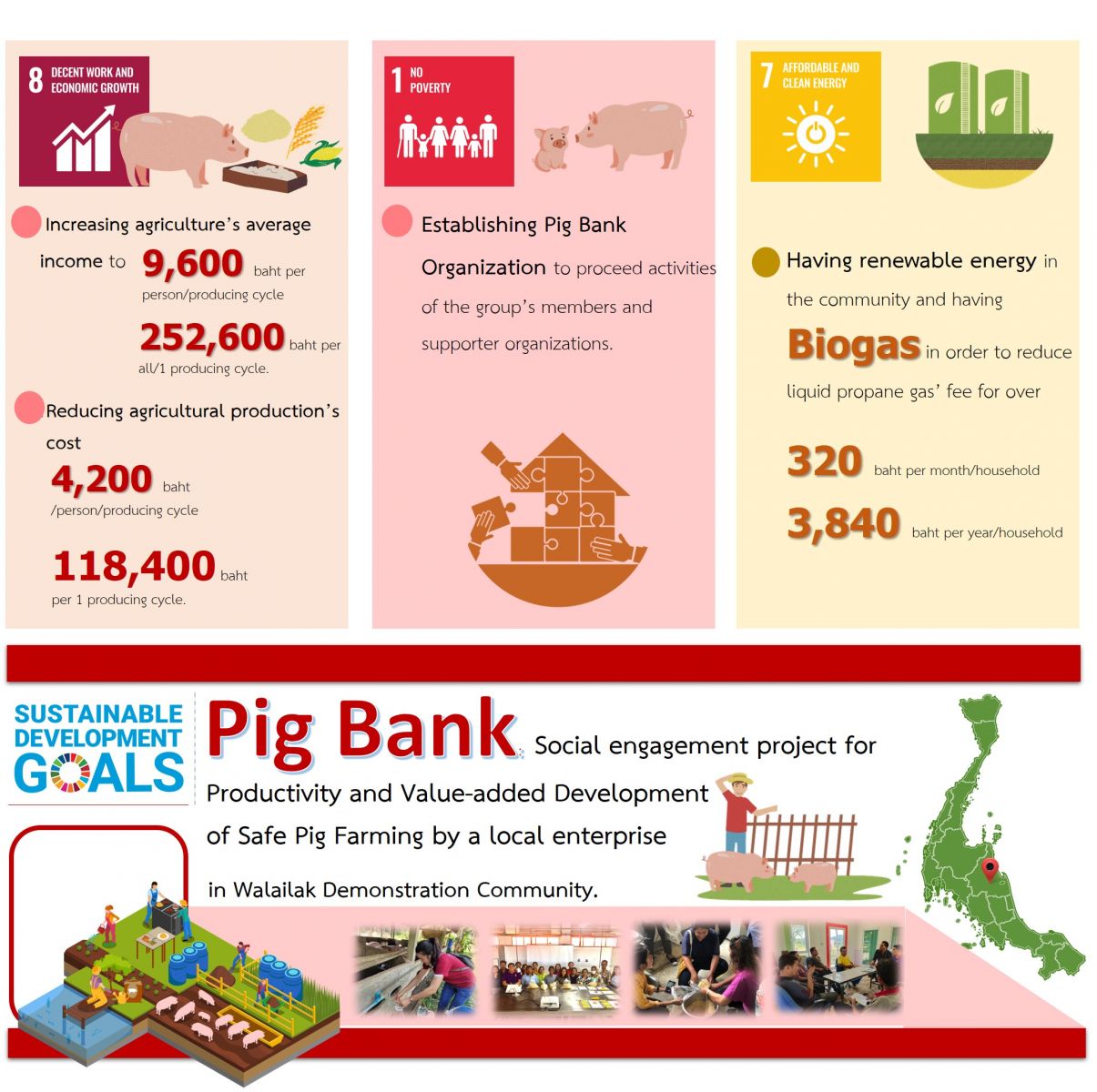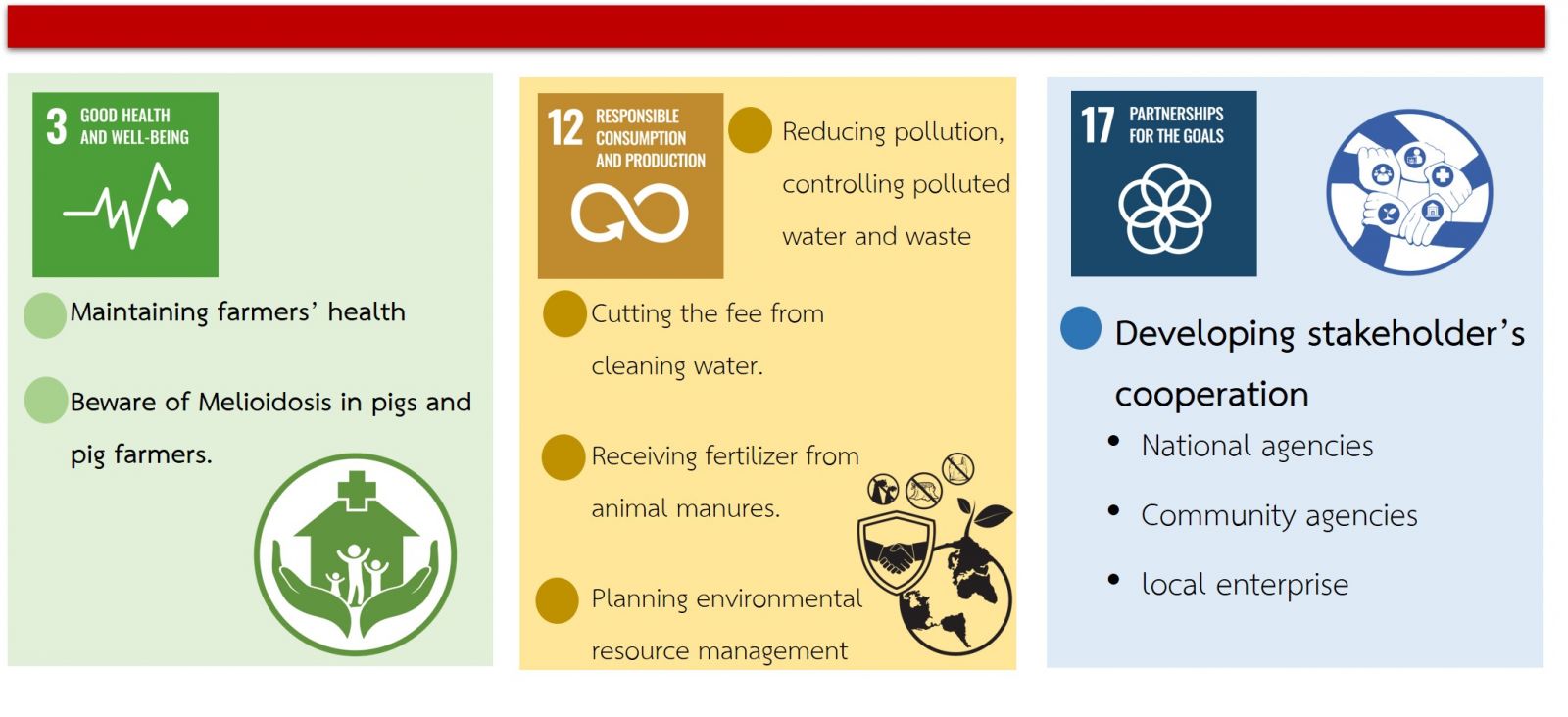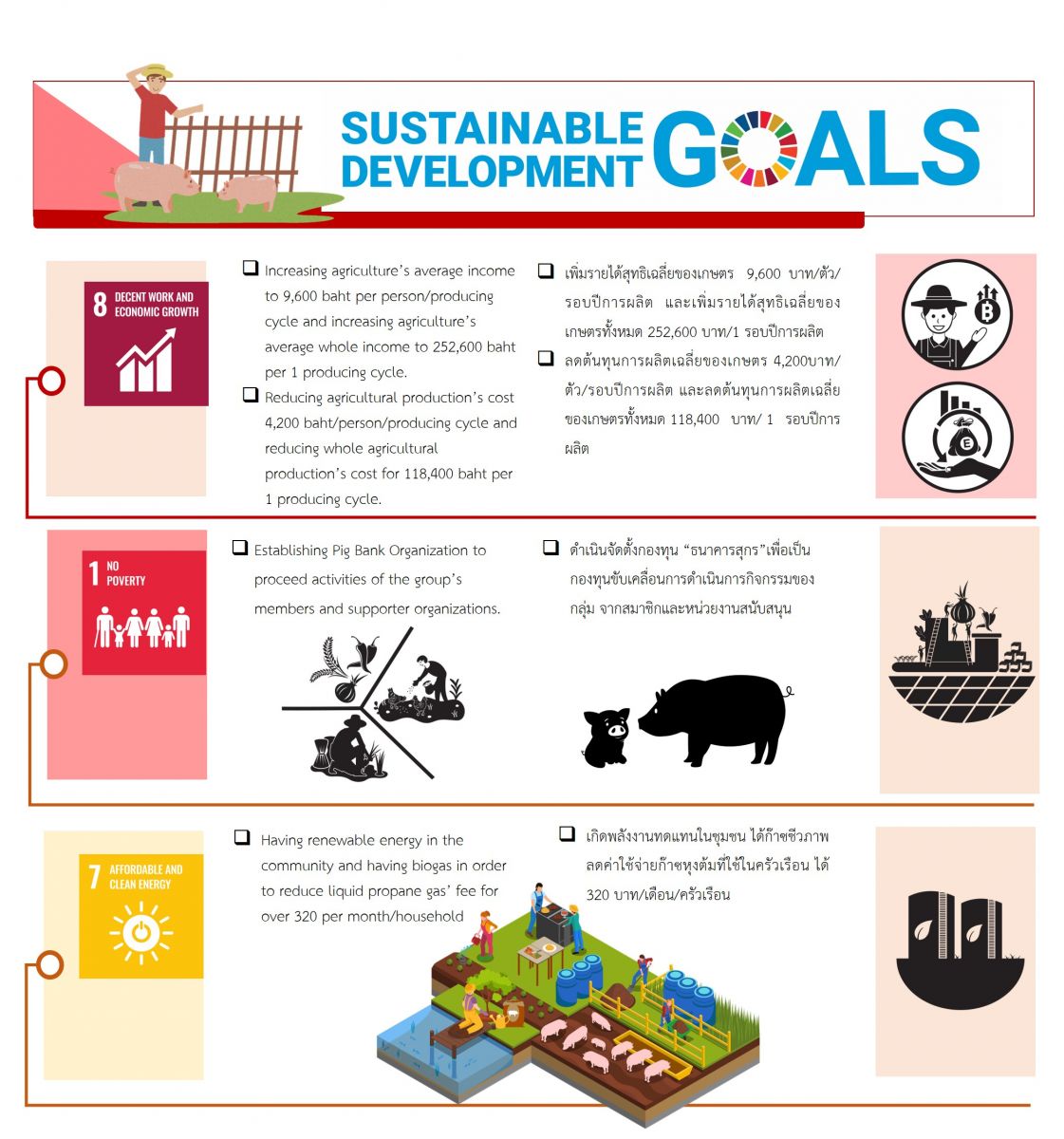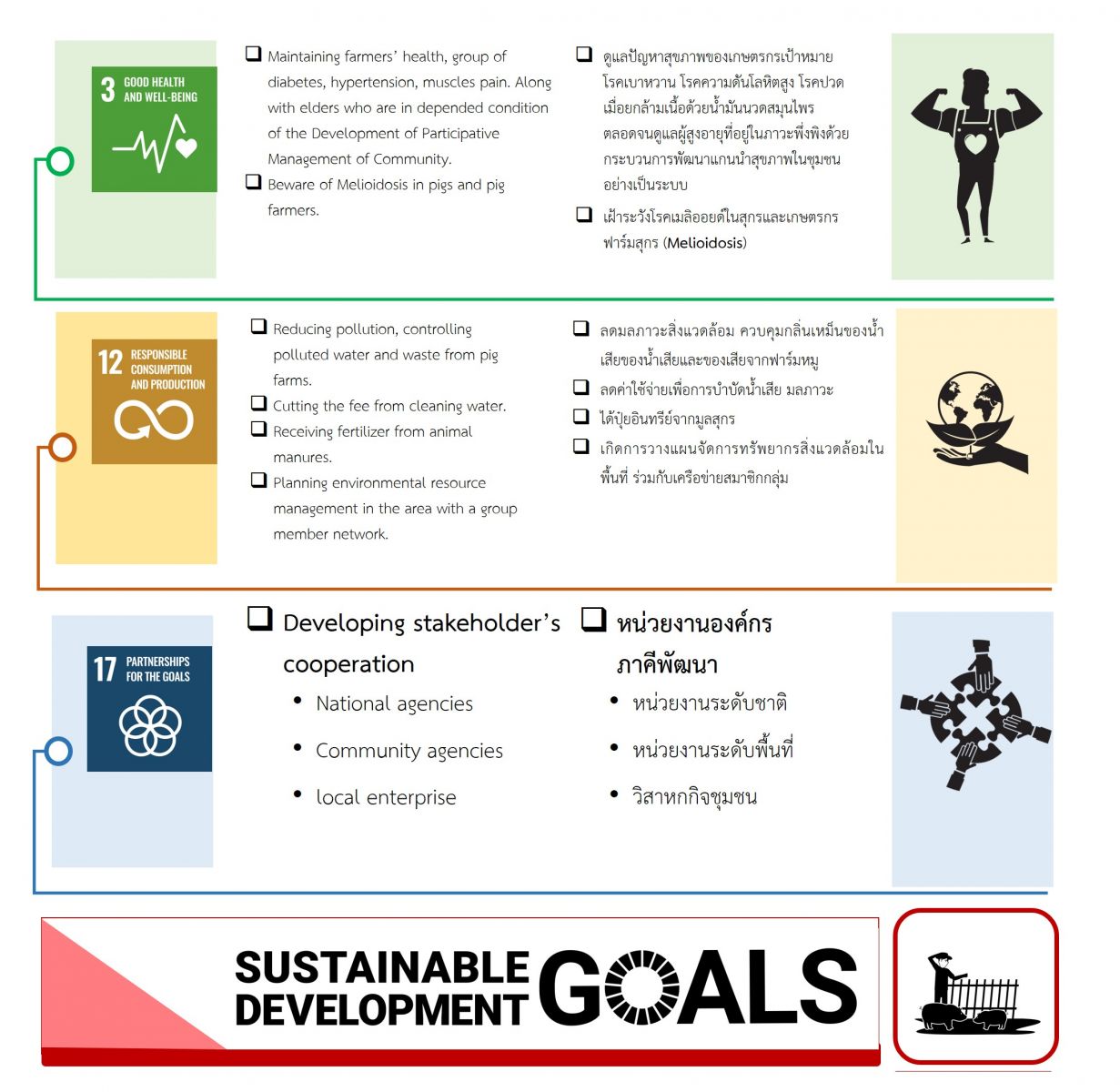Business & Economy
PIG BANK: Social engagement project for Productivity and Value-added Development of Safe Pig Farming by a local enterprise in Walailak Demonstration Community.
-
Walailak Demonstration Community, Thasala District, Nakhon Si Thammarat Province, is an ideal surrounding community of Walailak University. People in the community have an addition economic improvement profession which is pig farming. There are over 60 farms of small scales. Pig farm’s running includes breeding, raising, and fattening pigs.The difficulties that the farmers need help with are: 1) productivity, in terms of replacing the breeding animal, increasing fertility rate, increasing the weight of weaned pigs, health care of pigs, nurturing, nursing, and waste cleaning, etc. 2) management, in terms of systematic data recording for farm’s data or account, etc. 3) marketing, as the price from negotiating is relatively low, etc., which caused the farm to have low productivity and financial loss. Some farmers have already quitted.Unable to solve the problem individually, the farmers of ten families grouped together to send a letter of intent in requesting the academic knowledge for improving the quality of life through community development and finding the solutions for the following topics: enterprise group management, improve the quality standard of farms and goods for safety farming, marketing development and more marketing channels. The Center of Academic Service and a faculty of experts aim to create priorities and goals, along with cooperating development plans of partnership with the community, thus the social engagement project 2020. The project aims to up-level productivity and pig’s value with the safety process of the enterprise group. The project is led by Asst.Prof.Dr.Amonsak Sawusdee, The Center of Academic Service’s director, along with involving faculties: Rungrawee Jitpakdee and team, school of management, Dr.Krittika Kabploy and team, School of agricultural technology, and Asst.Prof.Dr.Nirattisai Rakmak and team, school of engineering and technology, along with cooperation from other institutions, both inside and outside of the university.
“Group farm enterprise”
Establish and develop enterprise group of community pig farm in Walailak Demonstration Community
-
Development process based on the community’s need and divisional working which create a more organized enterprise grouping which allows the group to remain stable in the long run and able to work toward goals more efficiently; target groups and participating networks gladly contribute. First-year’s goal is to improve product efficiencies and reduce the cost of pig’s nourishment (self-sustained) by making use of enterprise group management knowledge, technology, and innovation, and also settling processes. The results of the project are:
-
Establishing certificated community enterprise group
-
Extending the opportunity of career
-
Improvising for additional profession and income
-
Gathering for the solution to problems and hindrance. ‘Pig bank’ establishment is in process.
-
Improving the understanding of systematic accounting; spending and income.
-
Utilizing technology to level up careers and marketing channels
-
Creating database for each farm
-
Finding outer sources of funding
“Quality agricultural farming standard improvement and adjustment”
Develop a food formula for pig dams and improve the standard of Good Agriculture Pig’s farm (GAP) to increase productivity.
-
Aims to extend the knowledge of swine’s food and create a quality food formula of dam pigs based on the need of the community. Works as partners through involvement of all target parties and networks, resulting in contribution in every process, from field surveying, defining and prioritizing problems meeting, dam’s breed identifying, setting up database for each farm, designing and testing food formula, and transmitting knowledge, technologies and innovations of formulas. Furthermore, there will be cooperation from academic expertise providers to design a safety process for GAP by adjusting the foundation structure and farm management. The result of the process is healthier and faster breeding dams; healthier weight of weaned pigs, and also lower cost of food producing.
-
Increase net income of farmers to 9,600 bath/body/year and increase the net income of every farmer to 252,600 bath/annual produce (5 modeling farmers)
-
Reduce the cost of production approximately 4,200 bath/body/annual produce and reduce the annual production of every farmer by 118,400 bath (5 modelling farmers)
-
Extend the career opportunity for income. Form business running knowledge, and product for members which is pig’s food production from local ingredient.
-
Create farming account to acknowledge genuine cost and profit per production
-
More recording of information: Farm management data, account management in terms of cost, income, and breeding
-
Gathering for the solution to problems and hindrance. ‘Pig bank’ establishment is in process.
-
Utilizing technology to level up careers and marketing channels
“Eliminating Pollution and added value to economic”
Develop biogas model in a household level
-
This project focused on eliminating pollution in the environment, managing pigs manure by researching the possibility of using pigs manure in biogas with waste in the community. To help the pig farm environment and happily live with the community. To develop the right way of pigs manure managing model and waste disposal in the community. With the aim to answer the needs of the community, working as a partner, the target group and partners have cooperated in every step. The process are pig manure and community waste researching, elements and chemical techniques finding, biogas system designing and building. Moreover, there are system testing, technology training by using the knowledge, technology and biogas in household level innovation and the results of the project are
-
Reducing the environment and smell pollution from wastewater and farm’s waste
-
Reducing the cost of cooking gas per month by 320 bath per household and obtaining biogas to replace cooking gas.
-
Reducing the cost of wastewater conversion
-
Zero waste
-
Organic fertilizer from pig manure
-
Planning of natural resources management in the area from participants
-
Establishing the modeling base of Biogas learning and develop a scientific community for technological transmit
Happy Tree
Other than community developed by social engagement that focused on career enhancing for creating competitive opportunity and economic improvement, it also balances the development by improving and enhancing human capacity development. Expecting communities to be the happy tree, it is brought the academic knowledge to serve the connected community in other elements.
-
Leveling-up education by connecting based-learning of pigs nurturing and Sufficiency Economy Learning Center at Chumchon Mai School which created a course with an identity “ The Sufficiency Economy Integration Course” by a farmer expert.
-
Caring farmers’ health, group of diabetes, hypertension, muscles pain. Along with elders who are in depended condition of the Development of Participative Management of Community and aware of Melioidosis in pigs and pig farmers.




Inventor:
Assist.Prof.Dr.Amonsak Sawusdee
- The center for Academic Service
Assistant Prof. Dr. Rungrawee Jitpakdee
- School of Management
Asst.Prof.Dr. Nirattisai Rakmak
- School of Engineering and Technology
- School of Agricultural Technology
Walailak University, Thasala, Nakhon Si Thammarat 80160
Research Fundings:
- Walailak University
- National research council of Thailand
Research Fundings:
- Walailak University
- National Research Council of Thailand (NRCT)
WebPage:
